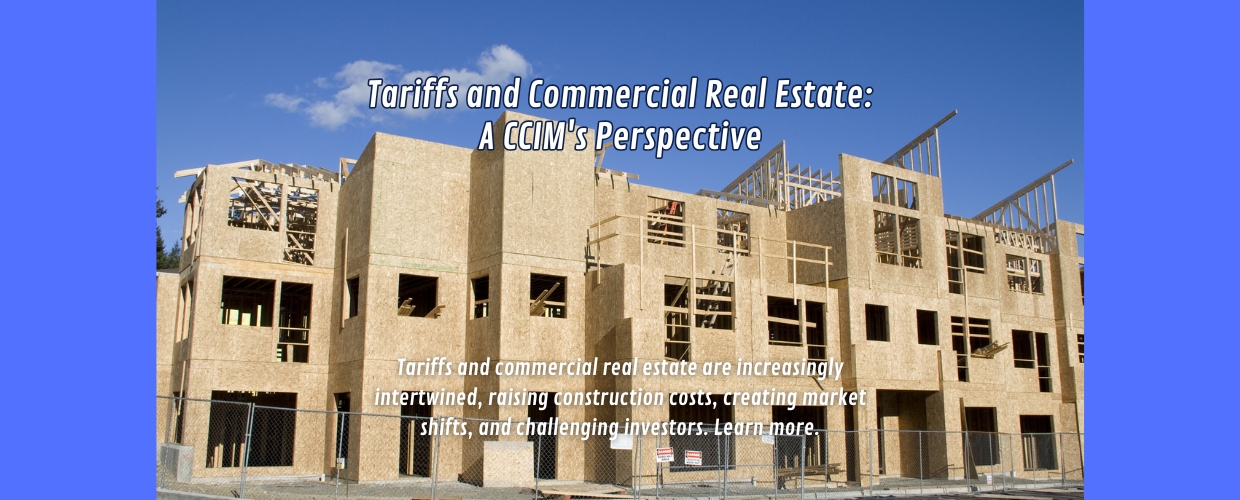Tariffs and Commercial Real Estate:
The Evolving Landscape
In today's climate, everyone is discussing tariffs and commercial real estate and wondering what the effects might be. Over the past several years, one of the most significant—and sometimes overlooked—factors influencing our industry has been the role tariffs play in shaping development costs, lease decisions, and overall market sentiment. Recent changes in U.S. trade policy, particularly those involving tariffs on steel, aluminum, and goods from major trading partners like Mexico, Canada, and China, have started to ripple through the commercial real estate sector. As these tariffs have taken hold, domestic manufacturers have often responded by raising prices to match the new market conditions. This situation has led to cost escalation for everything from structural beams to ceiling tiles.
Tariffs’ Immediate Impact on Building Materials
One of the first places where we see the real bite of tariffs and commercial real estate intersect is in raw materials and construction inputs. Developers and renovation teams alike have had to contend with rising prices for steel rebar, aluminum framing, copper wiring, and even lighting systems that use internationally sourced components. In some parts of the country, steel prices alone have jumped by up to 20%.
Given that modern commercial real estate projects use a substantial amount of steel and other metals, it’s no surprise that budgets have been driven higher—sometimes by millions of dollars. For instance, I have seen projects where the cost of a key steel order increased by 8% to 10% overnight. Other developers report being locked into initial quotes but fear that the overall cost of the build will climb by around 10% once all materials are tallied. These extra expenses can significantly impact profitability or even call an entire project into question.
Ripple Effects on Leasing and Development Timelines
Because of the uncertainty around tariffs and commercial real estate, some developers are choosing to pause, waiting for greater clarity in trade policy before breaking ground on new projects. Multifamily, office renovations, and ground-up developments alike are susceptible to delays. In some regions, large office tenants have also put interior renovation plans on hold as they reevaluate budgets in the face of higher quotes.

Commercial real estate construction costs were already subject to upward pressure due to wage inflation and strong demand in busy markets. Now, when tariffs raise material prices further, developers often respond by taking a more conservative approach. If a project’s financial model becomes too tight—especially in areas where land and labor costs are already high—stakeholders may prefer to wait for more stable conditions before committing to new builds or major renovations.
Tariffs and Commercial Real Estate: Market Sectors in Flux
Economic and Financial Market Considerations
Tariffs and Commercial Real Estate: Strategies for Moving Forward

Despite these challenges, savvy developers and investors can still find opportunities in this market. Locking in material prices early, exploring alternative sourcing for supplies, and partnering with experienced vendors are some of the ways to mitigate the impact of rising costs. As local manufacturing capacity grows, some markets may also see increased demand for warehouse or light-industrial space.
For investors, it’s vital to factor in not just current interest rates and consumer demand but also the long-term ramifications of tariffs. Even a moderate rise in construction costs can shift the break-even point for new developments or acquisitions. Close attention to market research and forward-looking economic indicators will help you anticipate potential risks and rewards.
Balancing Risk and Reward
At the end of the day, any kind of investment carries its own risks and potential rewards—and commercial real estate is no exception. Tariffs can add a layer of unpredictability, but they also present a chance to gain a competitive edge if you can adapt faster than others. If you are considering a commercial real estate investment of any kind, I strongly recommend seeking professional advice from someone who has studied the market deeply and understands how tariffs, inflation, labor costs, and other variables could affect your bottom line.
I’m here to help guide you through these complexities. Feel free to reach out to me for any questions about site selection, project feasibility, or broader market insights.
Brion Costa, CCIM
Century 21, Commercial
626-695-7385
DRE#: 00939864


